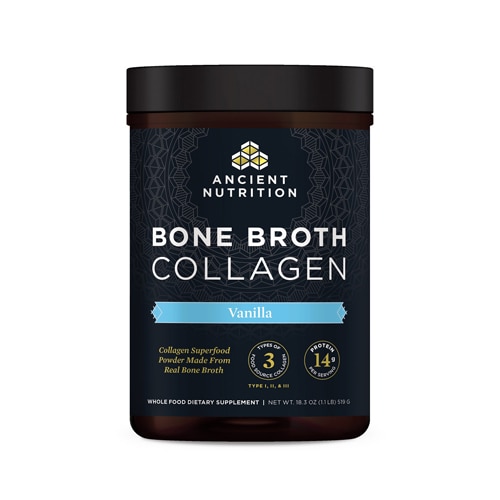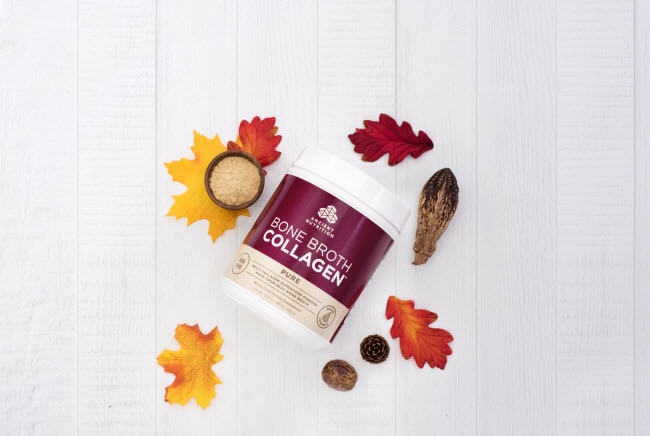Collagen products might be some of the most popular on the market right now, but many people remain about unsure about how collagen should be used and skeptical about the type of results they can expect.
First things first: what is collagen?
Collagen is actually something your body naturally produces in high amounts, since its the most abundant type of protein found in our bodies — concentrated in muscles, bones, skin, blood vessels, joints, tendons and the digestive system. Various types of collagen (especially types 1, 2, 3, 4, 5 and 10) essentially function as the “glue” or “building material” that helps hold our bodies together, making them strong and resilient, which is particularly important as we age.
When it comes to using collagen products, whether that means consuming collagen protein powder or using topical collagen skin treatments, here’s the scoop on some of your most common collagen questions:
What is collagen made of?
You may be wondering, where does collagen come from? The majority of collagen products are made from animal parts that today are normally discarded, such as bones, skin, scales and connective tissue from cows, chickens, fish and egg shells. These parts may not seem very appetizing, but they are extremely nutrient-dense and packed with vitamins, minerals, antioxidants, gelatin and collagen. Instead of discarding those parts as we commonly do today, our ancestors commonly made use of them, especially in the form of homemade bone broths and stocks.
Animal parts other than “muscle meat” contain amino acids in different ratios than meat like breasts, thighs, wings, etc. do. They also provide hard-to-get beneficial compounds such as collagen, chondroitin sulfate and glucosamine. While eating meat, eggs and fish has many benefits, for overall health it’s important to focus on variety so you can get a mix of different amino acids into your diet.
The three top ways to consume hard-to-get amino acids from collagen include: consuming collagen-rich foods (such as bone broth), taking collagen supplements, and eating an anti-inflammatory, well-rounded diet that helps increase absorption of the collagen you consume.
What should I look for in a quality collagen supplement?
Because there are over 28 different subtypes of collagen found in the human body, it’s beneficial to use a multi-collagen protein product, since different types have their own unique benefits. Most products will contain mostly type 1 and/or type 2 collagen (the types that our bodies use most of) but you can also look for a collagen product that contains a mix of collagen types 1, 2, 3, 4, 5 and 10 for example. This will help to address different parts of the body that are formed by collagen, such as tissues of your internal organs, your bones, cardiovascular system and extracellular matrix that makes up your skin.
Many collagen products contain “hydrolyzed collagen,” meaning the collagen has already been partially broken down, making the amino acids easier to absorb (or more “bioavailable”). Hydrolyzed collagen is typically the type used in capsules and protein powders and may be easier to utilize, especially for people with gastrointestinal issues that compromise digestion.
Gelatin is another type of product that is derived from collagen, however it isn’t as broken down. In other words, hydrolyzed collagen is gelatin that has been processed more intensively. Gelatin still has many benefits, including promoting the health of your joints, GI system and skin, and fighting inflammation.
How do I use collagen powder?
Collagen powder is virtually tasteless and odorless — and no, it doesn’t taste like chicken, beef, fish or eggs. If you're wondering how to use collagen, you'll be pleasantly surprised: the powder mixes instantly into liquids and can be incorporated into a variety of sweet or savory recipes. Try using one serving/small scoop 1-3 times daily, just like you would other protein powders. You can mix a scoop into 8 ounces of water or another liquid (such as as coffee, tea, juice or almond milk). It helps to vigorously shake, blend or stir the powder to help dissolve the collagen. Some other ideas include adding collagen to baked recipes like muffins, bars or pancakes to increase the protein content, or using some to thicken smoothies, desserts or recipes that have a gel-like texture.
How long does it take collagen supplements to work?
You can expect it to take several weeks to several months for you to see results from collagen products. You’ll know that collagen is working if you start noticing improvements in my skin, hair, digestion, physical performance, recovery from exercise and flexibility.
You may feel less aches and pains in your joints, find that your skin looks a bit tighter and more youthful, or notice that you’re less bloated and have more energy. Collagen is likely to work faster if you combine it with other supportive compounds, supplements and foods (more on these below) and if you work on reducing inflammation by exercising, sleeping enough and managing stress.
When’s the best time to take collagen?
You can use collagen any time of day that is most convenient, whether that means adding some to your morning smoothie or coffee, or stirring a scoop into a stew or soup for dinner.
One of the best times to have collagen protein powder is before exercising. When you consume collagen protein from foods or supplements, it is rapidly absorbed into your small intestine, especially during the "post-exercise recovery window,” when your connective tissues are in need of extra repair. Exercise is therefore one of the best collagen boosters, due to how it helps promote collagen uptake in the muscles, tendons and joints.
Try taking collagen orally (such as about 10-15 grams of collagen protein powder) about 30 minutes before exercising to help support tendon health, facilitate muscle repair and growth, and even help with pain management.
Should collagen be paired with any other supplements or foods to make it more effective?
Certain compounds help support the natural production and function of collagen within your body. These compounds are often naturally found in collagen-containing foods, such as bone broth, and are known as collagen cofactors. You can also look for supplements that include collagen cofactors to boost its effectiveness. Cofactors to focus on include: glucosamine (aim to consume 500 to 1,500 milligrams of glucosamine sulfate daily to help support joint recovery), chrondroitin (take about 800 to 1,200 milligrams of chondroitin sulfate daily for joint and bone health) and hyaluronic acid (consume about 50 to 80 milligrams orally once or twice each daily to promote skin health).
You’ll also want to include a variety of anti-inflammatory foods and antioxidants in your diet to both help with collagen synthesis and to aid in preventing collagen loss. Antioxidants are most concentrated in unprocessed plant foods, especially those that are brightly colored (such as orange, yellow, red and green foods).
Some examples of foods to include in our diet are: fruits high in vitamin C and antioxidants such as berries, kiwi, apples, citrus fruits and avocados; all types of vegetables like carrots, butternut squash, sweet potatoes, leafy greens, onions, tomatoes, bell peppers and cruciferous veggies; “superfoods” like green tea, raw cocoa, acai berry, goosebury, maca powder, spirulina, chlorella, apple cider vinegar, and medicinal mushrooms; and all types of fresh herbs and spices (especially turmeric, ginger, cilantro, parsley).
Do topical collagen products work?
You might recognize collagen peptides as an ingredient in some of your favorite anti-aging serums and body lotions. The idea is that collagen helps give your skin strength and elasticity, along with replacing dead skin cells. Unfortunately, your body’s natural collagen production begins to slow down as you age, especially after your 40s — and this is what we can thank for signs of aging, such as wrinkles and sagging. By the time you reach 40 years old, you will likely have lost 10 to 20 percent of your total collagen.
Certain double-blind, placebo-controlled studies have found evidence that 2.5–5 grams of collagen hydrolysate used among women between the ages of 35–55 once daily for eight weeks significantly improves skin elasticity, skin moisture, transepidermal water loss (dryness) and skin roughness. More good news? Collagen has been linked to little to no side effects. Some also find that using collagen helps reduce cellulite and stretch marks.
Collagen may work even better to improve your skin’s appearance if you use it along with other beneficial compounds like Indian gooseberry extract, retinol (the active form of vitamin A), hyaluronic acid, coconut oil, argan oil and shea butter (these can all be found in anti-aging creams, serums and lotions).
Remember that in order to keep your skin healthy, your best bet is to address all types of lifestyle factors that age your skin — like eating a diet high in inflammatory foods and sugar, smoking and high amounts of sun exposure (all of these also contribute to depleting collagen levels).
Is there vegetarian/vegan collagen?
There is no plant-based (vegetarian/vegan) option that offers all of the same benefits as collagen, since collagen (and gelatin too) is a unique protein that is only found in animals. That being said, vegetarians and vegans can support collagen production by eating collagen-boosting nutrients and getting enough protein in their diet. If you strictly avoid all animal-derived foods, be sure to get plenty of protein each day from different plant sources, such as nuts, seeds, legumes, 100 percent whole/ancient grains or plant-based protein powder.
Consuming a variety of anti-inflammatory foods that provide antioxidants is also critical for maintaining higher collagen levels. Plant-foods that provide vitamin C, vitamin A and other antioxidants are the best.
Even if you choose not to consume meat, eggs or fish, you may be willing to use collagen protein powder or to drink bone broth. Bone broth is considered a “superfood” because it contains amino acids such as glycine, proline and arginine, plus glucosamine, trace minerals like calcium and phosphorus. Whenever possible, look for bone broth that is ideally organic, non-GMO and sourced from grass-fed/pasture-raised animals. If you’re willing to, you may also incorporate cage-free eggs, organic dairy products (raw if possible) and/or fish in your diet in order to get enough “complete protein” and to obtain small amounts of collagen.
So what are the key takeaways about collagen products? The potential benefits associated with collagen are impressive — such as helping to repair joints, regenerate skin, soothe an inflamed digestive system, build muscle and aid in bone repair. Collagen contains many different types of amino acids, some of which are hard to get from other protein sources like meat.
Because your body’s collagen production declines as you, and since you need adequate collagen to retain strong bones, joints, and skin, it’s wise to boost your intake by using a hydrolyzed collagen protein powder, gelatin powder or by regularly drinking bone broth. For even better results, have collagen before a workout, load up on other antioxidant-rich foods to absorb absorption, and take steps to naturally help reduce collagen loss and inflammation.




